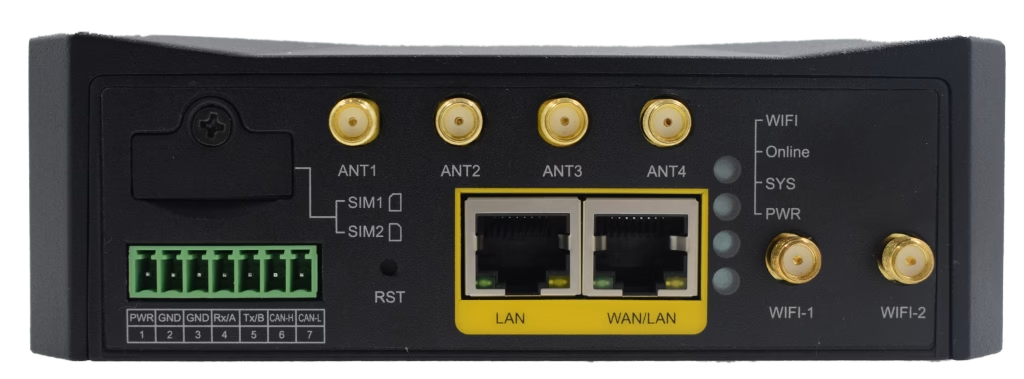Industrial IoT Routers vs Consumer Routers:
A Deep Dive Comparison
In the rapidly evolving landscape of the Internet of Things (IoT), the backbone of connectivity is paramount. Whether it’s for home use or industrial applications, routers play a crucial role in enabling seamless data transmission. However, the demands of industrial environments far exceed those of typical consumer settings, leading to the development of specialized industrial IoT routers. This blog post delves into a comprehensive comparison between industrial IoT routers and consumer routers, highlighting their key differences and the implications for AIOT (Artificial Intelligence of Things) deployments. 
Understanding the Basics
Before we dive into the specifics, let’s establish a foundational understanding of each router type:
-
Consumer Routers:
- These are the familiar devices found in homes and small offices, designed to provide internet access to a limited number of devices.
- They prioritize ease of use, affordability, and basic connectivity features.
- Their design and functionality are geared towards handling typical home network traffic, such as web browsing, streaming, and online gaming.
- Industrial IoT Routers:
- These are ruggedized, high-performance devices designed for demanding industrial environments.
- They prioritize reliability, security, and the ability to handle large volumes of data from numerous connected devices.
- Their design and functionality are tailored to support critical infrastructure and industrial automation applications.
- These are ruggedized, high-performance devices designed for demanding industrial environments.
Key Differences
Now, let’s explore the key differences that set these two router types apart:
1. Durability and Environmental Hardening:
- Consumer Routers:
- Typically housed in plastic casings, they are designed for indoor, climate-controlled environments.
- They are not built to withstand extreme temperatures, humidity, or vibrations.
- Industrial IoT Routers:
- Constructed with ruggedized metal casings, they are designed to operate in harsh industrial environments.
- They often feature extended temperature ranges, vibration resistance, and protection against dust and moisture (IP ratings).
- This is very important for deployments in factories, outdoor locations, and other challenging settings.
- Constructed with ruggedized metal casings, they are designed to operate in harsh industrial environments.
2. Reliability and Uptime:
- Consumer Routers:
- While sufficient for home use, they may experience occasional downtime or performance issues.
- They are not designed for mission-critical applications where uninterrupted connectivity is essential.
- Industrial IoT Routers:
- Engineered for high reliability and uptime, they often feature redundant power supplies and cellular backup capabilities.
- They are designed to minimize downtime and ensure continuous operation in critical applications.
- Engineered for high reliability and uptime, they often feature redundant power supplies and cellular backup capabilities.
3. Security:
- Consumer Routers:
- Offer basic security features, such as firewalls and WPA/WPA2 encryption.
- They may be vulnerable to cyberattacks if not properly configured or updated.
- Industrial IoT Routers:
- Incorporate advanced security features, such as VPN support, intrusion detection/prevention systems, and robust authentication protocols.
- They are designed to protect sensitive industrial data and prevent unauthorized access.
- Industrial network secutity is very important, because of the risk of very costly down time, and even danger to human life.
- Incorporate advanced security features, such as VPN support, intrusion detection/prevention systems, and robust authentication protocols.
4. Connectivity and Scalability:
- Consumer Routers:
- Typically offer limited connectivity options, such as Wi-Fi and Ethernet ports.
- They are designed to support a relatively small number of connected devices.
- Industrial IoT Routers:
- Provide a wide range of connectivity options, including cellular (4G/5G), serial ports, and industrial protocols (e.g., Modbus, PROFIBUS).
- They are designed to handle a large number of connected devices and support diverse industrial applications.
- Provide a wide range of connectivity options, including cellular (4G/5G), serial ports, and industrial protocols (e.g., Modbus, PROFIBUS).
5. Management and Monitoring:
- Consumer Routers:
- Offer basic web-based interfaces for configuration and management.
- They may lack advanced monitoring and diagnostic capabilities.
- Industrial IoT Routers:
- Provide robust management and monitoring tools, including remote management, centralized configuration, and detailed performance analytics.
- They enable administrators to proactively identify and resolve network issues.
- Provide robust management and monitoring tools, including remote management, centralized configuration, and detailed performance analytics.
Implications for AIOT Deployments:
The differences between industrial IoT routers and consumer routers have significant implications for AIOT deployments:
-
Reliability:
- AIOT applications often rely on real-time data and continuous connectivity.
- Industrial IoT routers ensure the reliability and uptime required for critical AIOT operations.
- AIOT applications often rely on real-time data and continuous connectivity.
-
Security:
- AIOT systems generate and process vast amounts of sensitive data.
- Industrial IoT routers provide the robust security features needed to protect this data from cyber threats.
- AIOT systems generate and process vast amounts of sensitive data.
-
Scalability:
- AIOT deployments may involve a large number of connected devices and data sources.
- Industrial IoT routers offer the scalability and connectivity options required to support complex AIOT architectures.
- AIOT deployments may involve a large number of connected devices and data sources.
-
Enviromental factors:
- Many AIOT deployments will be in locations that are not climate controlled. Using a consumer router in these locations will very likely lead to equipment failure.
Conclusion:
In conclusion, ChenAnIoT industrial IoT routers and consumer routers serve distinct purposes, with the former designed to meet the rigorous demands of industrial environments and AIOT deployments. By understanding the key differences between these router types, businesses can make informed decisions about their network infrastructure and ensure the success of their AIOT initiatives.
Share this:
- Click to share on Facebook (Opens in new window) Facebook
- Click to share on X (Opens in new window) X
- Click to share on WhatsApp (Opens in new window) WhatsApp
- Click to email a link to a friend (Opens in new window) Email
- Click to share on Reddit (Opens in new window) Reddit
- Click to share on LinkedIn (Opens in new window) LinkedIn
- Click to share on Pinterest (Opens in new window) Pinterest
- Click to share on Telegram (Opens in new window) Telegram
Related
Discover more from ChenAnIoT
Subscribe to get the latest posts sent to your email.




